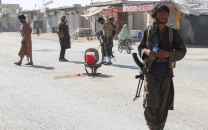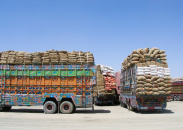India tops global internet shutdown chart
Since 2012, the country has snapped internet services more than 370 times

The experiment of snapping the internet services that started in Kashmir, more than 145 days ago, has now been extended to almost all states in India that have a Muslim population.
According to Access Now – a global human rights advocacy group, since 2012, India has snapped internet services more than 370 times, of which, 104 internet shutdowns happened in 2019, making the world's largest democracy the global leader of internet shutdowns.
A common tactic of authoritarian regimes – cutting internet services – has been Prime Minister Modi's favourite tool to mute dissenting voices. He has effectively used it in Kashmir after the territory's illegal annexation on August 5. But the move has drawn the ire from all quarters.
"Large parts of India today are under internet shutdown as well as with Section 144 imposed to prevent protests. This has never happened in any democracy before," said Prashant Bhushan, a Delhi-based public interest lawyer and active critic of the Modi government on Twitter. But it appears that the Modi government is willing to ignore all warnings.
Back to pre-internet stone age in offline Indian-occupied Kashmir
One such warning also came from former minister for state Shashi Tharoor, who said: "The internet shutdown is a violation of our fundamental rights."
The Indian government has been shutting phone and internet services in parts of the country to thwart a groundswell of protests over Modi's controversial citizenship law that excludes the Muslim population, who make up 14 per cent of the population.
After the passing of the contentious law in parliament, widespread protests have convulsed most major cities. The rise of internet shutdowns in India, critics said, is a tactic of censorship and repression in response to growing opposition to the government.
"The internet shutdown in India has become the primary tool to deny access to the outside world to the atrocities being committed by Indian police and paramilitary in Kashmir, Assam, UP and other states," said Syed Hassan Akbar, Director Strategic Security at Jinnah Institute, an Islamabad-based think tank.
"The fear of an RSS-backed marginalisation of Muslims is real," Akbar cautioned. "Serious allegations of Muslims being arrested, their homes vandalised and nearly 20 people killed speaks to the growing friction caused by the saffronisation of India," he added.
According to an estimate by Brookings Institute, a Washington-based think tank, internet disruptions are creating significant detrimental impacts on economic activity in India. Experts at the think tank believe the current round of forced outages comes at a price tag of $968 million. Another estimate puts the total loses during the last five years at $3 billion.
Modi, whose knee-jerk reaction at the first sign of unrest is to suspend the internet services, seems to care very little about the economy he once promised to expand. The Indian prime minister also made internet connectivity a major election plank before he won his first term as prime minister in 2014. At one digital summit that year, Modi said: "I dream of a Digital India where access to information knows no barriers." Little did India know, that those promises were meant to be broken.
One Indian rights activist, who spoke on the condition of anonymity, said: "By ignoring the economy or misleading the people on growth, by breaking his election promises about increasing connectivity, he is losing public trust and perhaps his popularity too.
“The Modi regime has normalised internet shutdowns and that is not normal."
Kashmir marks 100th day of communications blockade
While Modi believes the online clampdown will prevent protesters from gathering, one study, by a researcher at the Stanford Global Digital Policy Incubator, has found that shutdowns are counterproductive to deterring violent incidents. In fact, it tracked violence increased when networks were disrupted as compared to cases where the internet stayed on.
According to digital experts, with Kashmir still, offline, India may have cut off more than 60 million people in the current round of internet shutdowns. Data collected by Internet Shutdown Tracker, a portal that tracks such incidents across the country, shows internet connectivity was suspended in western Uttar Pradesh's Bijnor, Bulandshahar, Muzaffarnagar, Meerut, Agra, Firozabad, Sambhal, Aligarh, Ghaziabad, Rampur, Sitapur and Kanpur due to protests against the Citizenship Amendment Act.
All internet services ranging from 2G to 4G remain suspended in some parts of the country. Data mobile internet, bulk SMS-MMS, WhatsApp, Facebook, Twitter, and other social media services through internet service providers were also suspended.



















COMMENTS
Comments are moderated and generally will be posted if they are on-topic and not abusive.
For more information, please see our Comments FAQ